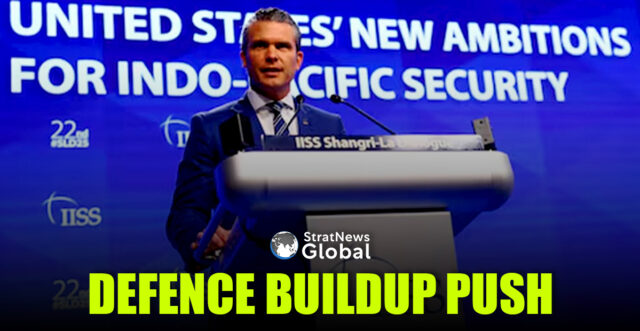U.S. Defense Secretary Pete Hegseth on Saturday cautioned that the threat posed by China is real and potentially imminent, urging Indo-Pacific allies to increase their defence spending to strengthen regional security.
Hegseth, speaking for the first time at the Shangri-La Dialogue in Singapore, Asia’s premier forum for defence leaders, militaries and diplomats, underlined that the Indo-Pacific region was a priority for the Trump administration.
“There’s no reason to sugar coat it. The threat China poses is real, and it could be imminent,” Hegseth said, in some of his strongest comments on the Communist nation since he took office in January.
China-Taiwan Tensions
He added that any attempt by China to conquer Taiwan “would result in devastating consequences for the Indo-Pacific and the world”, and echoed Trump’s comment that China will not invade Taiwan on the president’s watch.
China views Taiwan as its own territory and has vowed to “reunify” with the democratic and separately governed island, by force if necessary. It has stepped up military and political pressure to assert those claims, including increasing the intensity of war games around Taiwan.
Taiwan’s government rejects Beijing’s sovereignty claims, saying only the island’s people can decide their future.
“It has to be clear to all that Beijing is credibly preparing to potentially use military force to alter the balance of power in the Indo-Pacific,” Hegseth said.
But his comments on allies needing to increase spending is likely to cause consternation amongst partners, even though experts said Hegseth would face a relatively friendly audience in Singapore.
China Skips Summit
China’s Defence Minister Dong Jun has decided to skip the major Asian security forum, and Beijing has sent only an academic delegation.
Hegseth has previously taken aim at allies in Europe for not spending more on their own defence. In February, he warned Europe against treating America like a “sucker” while addressing a press conference at NATO headquarters in Brussels.
On Friday, while delivering the keynote address at the Shangri-La Dialogue, French President Emmanuel Macron said Hegseth was justified in asking Europe to increase its own defence spending.
“It’s hard to believe, a little bit, after some trips to Europe, that I’m saying this, but thanks to President Trump, Asian allies should look to countries in Europe as a newfound example,” Hegseth said.
“NATO members are pledging to spend 5% of their GDP on defence, even Germany. So it doesn’t make sense for countries in Europe to do that while key allies in Asia spend less on defence in the face of an even more formidable threat, not to mention North Korea.”
Dutch Defence Minister Ruben Brekelmans said it was important to have Hegseth acknowledge that European countries were stepping up.
“It was for me maybe the first time or one of the first times I heard the U.S administration acknowledge this explicitly,” Brekelmans said, referring to Hegseth’s comments.
‘Patronising’
U.S. Democratic Senator Tammy Duckworth, who is co-leading a bipartisan delegation to the Shangri-la Dialogue, said it was noteworthy that Hegseth emphasised that the United States was committed to the region, but his language on allies was not helpful.
“I thought it was patronising of our friends in the Indo-Pacific in particular,” Duckworth said.
Spending on weapons and research is spiking among some Asian countries as they respond to a darkening security outlook by broadening their outside industrial partnerships while trying to boost their own defence industries, according to a new study by the London-based International Institute for Strategic Studies, the organisation that runs the Shangri-La Dialogue.
The spike comes even as Asian nations spent an average of 1.5% of GDP on defence in 2024, a figure that has kept relatively constant over the last decade, it said.
Hegseth suggested that allies in Europe focus on security on the European continent, so that Washington could focus on the threat posed by China in the Indo-Pacific, alongside more participation by allies in Asia.
“We would much prefer that the overwhelming balance of European investment be on that continent, so that as we partner there, which we will continue to do, we’re able to use our comparative advantage as an Indo-Pacific nation to support our partners here,” he said in response to a question after his speech.
But some of the Trump administration’s early moves in the Indo-Pacific have raised eyebrows. The U.S. moved air defence systems from Asia to the Middle East earlier this year as tensions with Iran spiked – an effort that took 73 C-17 flights.
‘Restoring Warrior Ethos’
Hegseth, a former Fox TV host who has spent much of his first months in office focused on domestic issues, spoke to the international audience on topics that he has frequently talked about when in the United States, like “restoring the warrior ethos.”
“We are not here to pressure other countries to embrace or adopt our politics or ideology. We are not here to preach to you about climate change or cultural issues,” Hegseth said. “We respect you, your traditions and your militaries. And we want to work with you where our shared interests align.”
(With inputs from Reuters)





